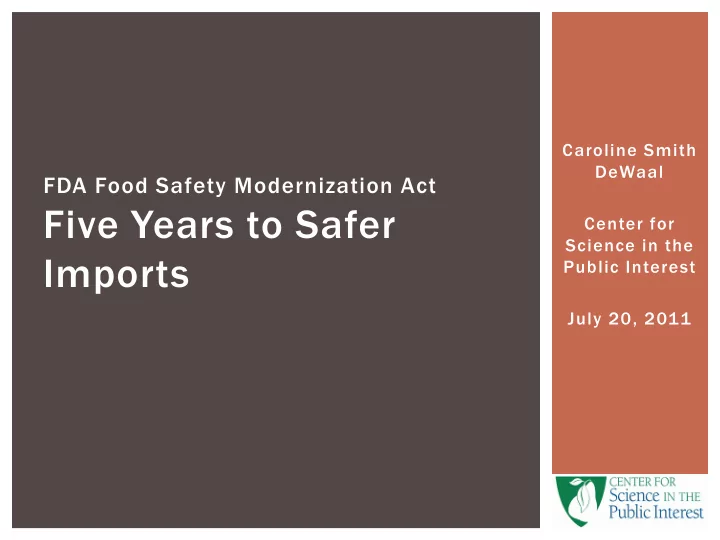

Caroline Smith DeWaal FDA Food Safety Modernization Act Five Years to Safer Center for Science in the Imports Public Interest July 20, 2011
CSPI/SFI and IACFO The Center for Science in the Public Interest (CSPI) is a bi-national NGO representing over 850,000 consumers in both the U.S. and Canada. Safe Food International (SFI), a CSPI project, partners with consumer organizations in other regions of the world on food safety issues. The International Association of Consumer Food Organizations provides representation in Codex for consumer organizations on five continents.
FDA Food Safety Modernization Act Foreign facilities: Register biennially May be suspended Prevention programs Inspection mandate Foreign offices President Obama signs FSMA Jan. 4, 2011 Foreign Supplier Verification Program Voluntary Qualified Importer Program Capacity building programs Certification of high-risk foods
Timeline 20 2011 11 2012 2013 2014 20 2015 15 Regis gistrati tion st Re nd Re 1 st Re-registr trati tion 2 nd Re-registr trati tion Inspections In 600 600 1, 1,20 200 2,40 2, 400 4,80 4, 800 9,60 9, 600 Foreign O Office ces Prevention Small Very Small FSVP VQIP Capacity ty B Bld ldg Certification 3 rd Party Auditors Authority Accreditation
Year 1: Registration (and Suspension) 16 166,00 000 21 Countries with 3,000 or more Registered Facilities 20,000-29,999 10,000-19,999 191,000 o 0 of 252,000 00 F Foreign gn 5,000-9,999 Facilities ( (70 p percent) are 3,000-4,999 located i in thes ese 2 e 21 countries es.
Year 1: Foreign Facility Inspection New mandate to inspect foreign facilities Double foreign facility inspections every year for five years Can refuse products from facilities that refuse inspection Interagency agreements on inspection of seafood
Year 1: Foreign Offices Brussels Beijing London New Delhi Shanghai Parma Mexico City Guangzhou Mumbai San Jose Santiago
Year 1: Border Inspection Changes to border inspections Interagency agreements on inspection of seafood Risk-based border inspection
Timeline 20 2011 11 2012 2013 2014 20 2015 15 Regis gistrati tion 1 st Re-registration 2 nd Re-registration Inspections In 600 1,200 2,400 4,800 9,600 Foreign O Office ces Prevention Small Sm Very S Small FSVP VQIP Capacity ty B Bld ldg Certification 3 rd Party Auditors Authority Accreditation
18 Months: Prevention Foreign and domestic facilities must implement a food safety plan that includes: Hazard analysis Preventive controls Sanitation Employee training Food allergen control Supplier Verification GMPs Recall plan Environmental monitoring Monitoring and records Verification steps Corrective action plan Records of corrective actions Recall plan
Year 2: Foreign Supplier Verification Program Importers must implement FSVP that includes: Assurance that foreign supplier has risk- based preventive controls. Verification steps such as -- Monitoring records for shipments, Lot-by-lot certification, Annual on-sight inspection, Checking foreign supplier’s HACCP plan, or Verification testing. Records that must be accessible for inspection.
FSVP Introduces “Look-Back” to Enhance Import Safety Importer is accountable for product’s safety. FSVP required regardless of risk.
18 Months: Voluntary Qualified Importer Program Importers may obtain expedited review Application (notice of intent to participate in VQIP) Certified facility is source for food FDA reviews application for risk factors
VQIP Lets Importers Jump to Head of Line Contribution to safety Assesses safety before product reaches border. Reduces number of import lines needing review, improving risk-based targeting of border inspections.
Timeline 2011 20 11 2012 2013 2014 20 2015 15 Regis gistrati tion 1 st Re-registration 2 nd Re-registration In Inspections 600 1,200 2,400 4,800 9,600 Foreign O Office ces Prevention Small Very Small FSVP VQIP Capacity ty B Bld ldg Certification 3 rd Party ty A Audito tors Auth thority Accr creditation
Capacity Building Foreign Governments can be “trusted partners” for ensuring import safety Mutual recognition of foreign inspection reports, Training of foreign governments and producers, Acceptance of lab methods/testing.
Certification Certification assures High-risk imported food meets U.S. requirements Food is eligible for VQIP. Certification may be from government or qualified 3 rd party auditor. 3 rd party auditors -- accredited by recognized accrediting bodies – may be: Foreign governments, Foreign cooperatives, or Private parties
Mandatory Certification of High-Risk Foods FDA may require certifications of high-risk foods if there are: Known safety risks associated with the food Known safety risks associated with the place food originates from A finding by Secretary that foreign food safety system is inadequate A finding by Secretary that certification would assist border inspections
Certification: Final Check for High-Risk Food 2 Forei eign g gover ernmen ent or 3 rd pa accred edited ed 3 party a audi dits facility f for c compliance w with U.S. r req equiremen ents. 1 Secreta tary d design ignates food o or regi gion a as hig igh-risk an k and requires c certification. 3B 3B Certification i is 3A 3A commu mmunicated t to 3 Impo porter’s F s FSVP FDA w wit ith s ship ipment t Based ed o on findings, includes es c chec eck f for or by o other s specified aud uditor i iss ssue ues certification. met ethod. certification.
Voluntary Qualified Importer Program Foreign Supplier Verification Program Importer Programs Capacity Building Border Inspection Foreign Offices Registration Foreign Inspection Brussels Beijing London New Delhi Shanghai Parma Mexico City Guangzhou Mumbai San Jose Santiago
Thank you! Caroline S oline Smit ith h DeWaa aal Food S od Safet ety Direc ector or Cen Center f for or Science in the e Pu Public I Inter erest 1220 220 L Street, NW, Su Suite 300 300 Was ashington, D DC 20005 20005 Ph Phone: (2 (202) 7 777-8366 Fax: ( (202) 2 265-4954 E-mai mail: : cdewaal aal@cspinet.or .org On On the i e int nter ernet: www.csp spinet. t.org and d www.s .saf afefood oodinternat ation onal al.or .org
Recommend
More recommend